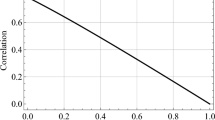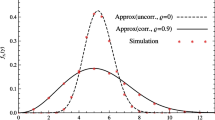Abstract
A precise bit-error probability analysis method for multicode DS-CDMA systems in Rayleigh fading is derived. The proposed method applies to a multicode DS-CDMA system with an arbitrary number of multiple code sequences and any selection of multiple code sequences. The method gives accurate results for Rayleigh fading while requiring only a single numerical integration of an integrand involving the well-known Q-function. The solution discriminates the effect of the selection of different multiple code sequences on the bit-error probability, whereas Gaussian approximations do not. Numerical examples show that the differences between exact and approximate methods for a multicode DS-CDMA system operating over Rayleigh fading channels may be more significant than for a single code system in Rayleigh fading channels or for a multicode system in AWGN channels when the spreading factor is not significantly large compared to the number of multiple code sequences.
Similar content being viewed by others
References
Steele R., Lee C.-C., Gould P. (2001) GSM, cdmaOne, and 3G Systems. Wiley, England
Liu Z., Karol M.J., Zarki M.E., Eng K.Y. (1996) Channel access and interference issues in multi-code DS-CDMA wireless packet (ATM) networks. Wireless Networks 2: 173–193
Fong M.-H., Bhargava V.K., Wang Q. (1996) Concatenated orthogonal/PN spreading sequences and their application to cellular DS-CDMA systems with integrated traffic. IEEE Journal on Selected Areas in Communications 14: 547–558
Lee S.J., Lee H.W., Sung D.K. (1999) Capacities of single-code and multicode DS-CDMA systems accommodating multiclass services. IEEE Transactions on Vehicular Technology 48(2): 376–384
Kim D.K., Sung D.K. (2001) Capacity estimation for a multicode CDMA system with SIR-based power control. IEEE Transactions on Vehicular Technology 50(3): 701–710
Kang C.S., Sung D.K. (2002) Capacities of spectrally overlaid single-code and multicode CDMA systems. IEEE Transactions on Vehicular Technology 51(5): 839–854
Kim D.I., Hossain E., Bhargava V.K. (2003) Dynamic rate adaptation based on multidimensional multicode DS-CDMA in cellular wireless networks. IEEE Transactions on Communications 51(2): 247–260
Zhang R., Tjhung T.T., Zhang H.B., He P. (2001) BEP performance comparison of single code and multicode DS/CDMA channelization schemes for high rate data transmission. IEEE Communications Letters 5(2): 67–69
Lee S.J., Kim T.S., Sung D.K. (2001) Bit-error probabilities of multicode direct-sequence spread-spectrum multiple-access systems. IEEE Transactions on Communications 49(1): 31–34
Morrow R.K. Jr., Lehnert J.S. (1989) Bit-to-bit error dependence in slotted DS/SSMA packet systems with random signature sequences. IEEE Transactions on Communications 37(10): 1052–1061
Holtzman J.M. (1992) A simple, accurate method to calculate spread-spectrum multiple-access error probabilities. IEEE Transactions on Communications 40: 461–464
Lee, S. J., & Beaulieu, N. C. (2005). Error rate analysis of asynchronous multicode DS-CDMA systems. In. Proc. IEEE GLOBECOM2005, November 28–December 2, 2005, St. Louis, Missouri.
Lee S.J., Beaulieu N.C. (2006) Precise analysis of bit-error probability for asynchronous multicode DS-CDMA systems. IEEE Transactions on Communications 54(4): 637–647
Cheng J., Beaulieu N.C. (2002) Accurate DS-CDMA bit-error probability calculation in Rayleigh fading. IEEE Transactions on Wireless Communications 1: 3–15
Papoulis, A., & Pillai, S. U. (2002). Probability, random variables, and stochastic processes, 4th ed., McGraw-Hill.
Lehnert J.S., Pursley M.B. (1987) Error probabilities for binary direct-sequence spread-spectrum communications with random signature sequences. IEEE Transactions on Communications COM-35: 87–98
Pursley M.B. (1977) Performance evaluation for phase-coded spread-spectrum multiple-access communication—Part I: System analysis. IEEE Transactions on Communications COM-25: 795–799
Press, W. H., Teukolsky, S. A., Vetterling, W. T., & Flannery, B. P. (1992). Numerical recipes in C: The art of scientific computing, 2nd ed., U.K.: Cambridge.
Kreyszig, E. (1984) Advanced engineering mathematics, 4th ed., Wiley.
Author information
Authors and Affiliations
Corresponding author
Rights and permissions
About this article
Cite this article
Lee, S.J., Beaulieu, N.C. Bit-Error Probability of Asynchronous Multicode DS-CDMA Systems in Rayleigh Fading. Wireless Pers Commun 52, 799–812 (2010). https://doi.org/10.1007/s11277-009-9663-x
Received:
Accepted:
Published:
Issue Date:
DOI: https://doi.org/10.1007/s11277-009-9663-x




